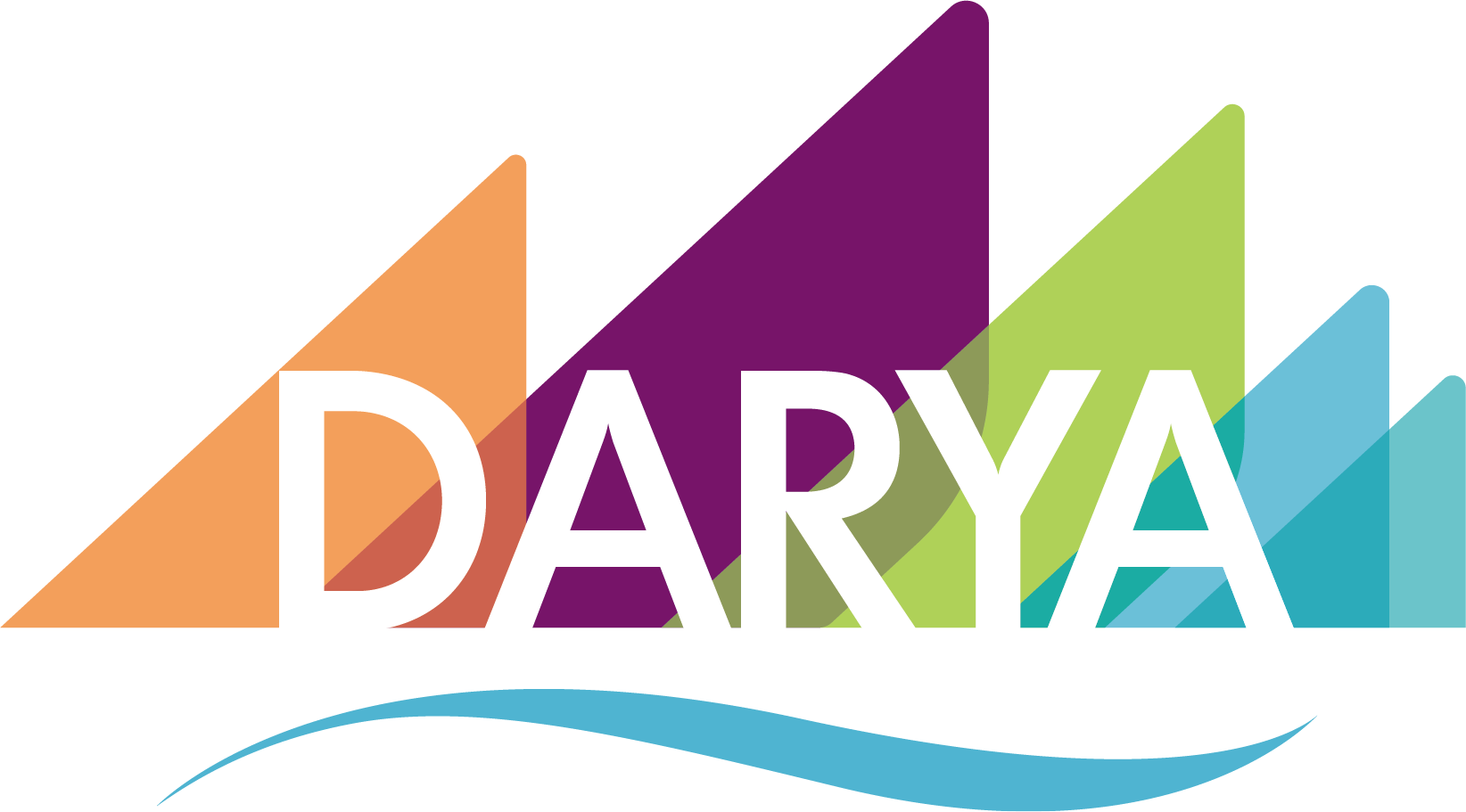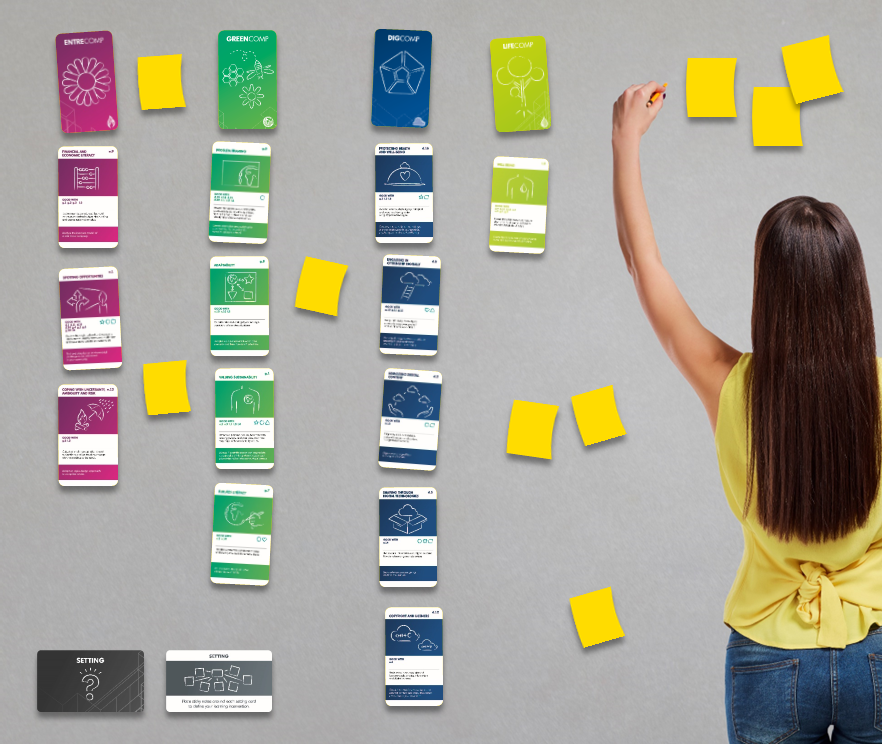
30 years, 30+ stories: The ETF in Central Asia. Can 102 cards foster long-term cooperation?
As part of the EU-funded DARYA (Dialogue and Action for Resourceful Youth in Central Asia) project, the European Training Foundation (ETF) is introducing a new tool, SCAFFOLD, to support competence-based learning in five Central Asian countries: Kazakhstan, Kyrgyzstan, Tajikistan, Turkmenistan and Uzbekistan.
Launched in March this year, the DARYA SCAFFOLD initiative aims to support educators to develop a professional understanding and practice of key competences and the EU-related competence frameworks – GreenComp, EntreComp, LifeComp and DigComp – and their application for developing competence-based flexible approaches to teaching and learning.
This will be done through a series of activities throughout 2024, including the training of a group of 102 SCAFFOLD trainers, a series of 9 webinars open to educators from Central Asia and accessible in all national languages, and a regional competition. The training of SCAFFOLD trainers started online on 5 April, while the week of 15–19 April will be fully dedicated to face-to-face training events in Astana, organised in cooperation with the Kazakh Ministry of Education.
DARYA: a new chapter in 30 years of cooperation between Central Asia and the ETF
Kazakhstan, Kyrgyzstan, Tajikistan, Turkmenistan and Uzbekistan were among the first countries to work with the ETF when it was established in 1994.
"Since then, the ETF has been at the forefront of skills development within a regional perspective. From around 2006, the ETF introduced the concept of national qualifications frameworks to the region, while from 2008 its Central Asia team worked on the development of vocational schools for lifelong learning. When the Central Asian Education Platform was established in 2012, the ETF actively contributed to it, for example by facilitating its working group on evidence-based policy making," says Samuel Cavanagh, ETF project manager.
In 2022, we launched DARYA, the first EU-funded regional project focused entirely on vocational education and training (VET) and skills development. A flagship initiative in Europe-Central Asia relations, DARYA is inspired by the 2019 EU Strategy for Central Asia as well as EU policies and tools in the sphere of education and training and youth employability.

The €10 million project, which runs for five years from 2022 to 2027, aims to support skills development in the region, while creating a platform to bring the EU closer to Central Asian countries and strengthen cooperation between the five countries themselves.
SCAFFOLD: a set of cards to transform learning
SCAFFOLD was developed jointly by the European Training Foundation, as part of its Creating New Learning initiative, and the European Commission's Joint Research Centre, as part of its work on key competences with the Directorate-General for Employment, Social Affairs and Inclusion.
It consists of a deck of 102 cards designed to facilitate interactive and learner-centred teaching and learning activities. SCAFFOLD aims to empower educators by providing them with adaptable resources to improve teaching effectiveness, encourage critical thinking and promote active student engagement in the learning process.
The SCAFFOLD cards act as 'building blocks' to help educators creatively design learning experiences according to their goals and the needs of their learners. As a set of cards, it is portable and easy to use collaboratively.
It has a fluid structure to encourage creativity and can be scaled according to user needs. Above all, SCAFFOLD is suitable for any subject area and can be used at any level of the education system or for any type of non-formal learning.

Introducing SCAFFOLD in Central Asia: a large-scale pilot phase
DARYA supports skills development in Central Asia in three thematic areas: improving evidence to understand skills needs, more flexible qualifications and inclusive teaching and learning. Under the latter thematic module, the introduction of SCAFFOLD to the five countries is taking place.
From 15 until 17 April, a group of 102 trainers – one for each SCAFFOLD card – from five Central Asian countries will take part in a three-day regional training session. The first of the three sessions aims to deepen the understanding and skills of teachers and trainers in the effective use of SCAFFOLD cards.
The trainers are nominated by the national authorities of the five Central Asian countries. They are either experienced educators or play a role in the professional development of educators, such as the development of standards and curricula in their country.
The training session in Astana will continue on 18 April 2024 for trainers from Kazakhstan to inspire and support educators in their country. A special session for educators from across Kazakhstan will conclude the Astana SCAFFOLD week. The session will be open to 150 educators interested in innovative methods.
"The launch of DARYA SCAFFOLD aims to make the tool as accessible as possible. We want to reach more than 1,000 trainers by the end of the year and inspire them to actively use SCAFFOLD in their teaching practice," says Christine Hemschemeier, DARYA content coordinator and Focal Point for Central Asia at the ETF.
"SCAFFOLD is a tool for lifelong learning and we are really pleased to see that we have many nominated trainers coming from outside the VET system, from general secondary education and even adult education. It is also the first time that we have the opportunity to involve many participants coming from outside the capital cities and to work in national languages.”
An important feature of this SCAFFOLD induction work is the piloting of a school-based approach in Kazakhstan and Kyrgyzstan, with a total of 15 schools (general education and vocational) committed to working with SCAFFOLD in a systematic way. Educators in the pilot schools will have the opportunity to collaborate and coordinate their teaching and learning approaches.
"In many cases, new teaching approaches are introduced to individual teachers through in-service training. But it is difficult for a single educator to sustain change when working alone," continues Hemschemeier.
"That is why we wanted to support a school team-based approach, as we expect it to have a stronger impact on both educators and students. During 2024, we want to understand whether this assumption is correct, but also what kind of support a school-based approach would need to be scaled up. If successful, we plan to open up the school-based approach to other countries."
In this first phase, the pilot schools will receive coaching support and will also be able to share experiences through peer learning sessions.
The first phase of this SCAFFOLD initiative will run until April 2025. From September 2024, a competition will be launched for educators from the region to submit the cases of innovative teaching practices they have developed based on SCAFFOLD.
"We want to motivate educators to work with SCAFFOLD in their teaching practice, but also to showcase the many cases of good practice that we are sure will emerge across the region," concludes Hemschemeier.
Background information
About DARYA: Dialogue and action for resourceful youth in Central Asia
About SCAFFOLD: Scaffold: a card game to revolutionise teaching
Upcoming events
15–17 April: DARYA: SCAFFOLD regional training session for national trainers | ETF (europa.eu)
18 April: DARYA: SCAFFOLD national training for trainers from Kazakhstan | ETF (europa.eu)
19 April: DARYA: SCAFFOLD – competences for life | ETF (europa.eu)
Did you like this article? If you would like to be notified when new content like this is published, subscribe to receive our email alerts.